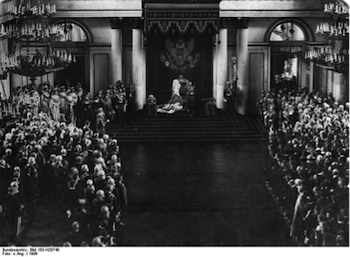This section covers the period between 1905 and 1914. We will be asking how successful the Tsarist regime was in restoring order and stability after 1905? Was it possible to reform the Tsarist system on liberal parliamentary lines? What were Stolypin's achievements? How far did he improve the lives of the peasants? And why did he fail? You will find some answers to these questions in this section, which contains extracts from my books, photographs and a video, and a reading list. Register here to get information on accessing more materials including my responses to exam questions on these themes.

Ceremonial opening of the Duma, 1906
The political history of Russia between the two revolutions of 1905 and February 1917 could be characterized as a battle between the court and parliamentary forces. During the initial period, from 1905 to 1907, when there was a risk that he might lose his throne, Nicholas II made concessions to the Duma's supporters; but once the revolutionary danger passed, he put a halt to these reforms.
The reforms promised by the tsar in the October Manifesto were realised in the Fundamental Laws of April 1906. The Fundamental Laws were not a 'constitution' - a word rejected by Nicholas II as incompatible with his coronation oath - because the Tsar's sovereignty did not derive from them. Read more...
Few figures in Russian history have aroused so much controversy as Petr Arkadevich Stolypin. Read more...
The dismantling of the village commune - the organizing kernel of the revolution on the land - was the most important of Stolypin's reforms. Read more...
There were profound cultural reasons for the peasants to oppose the break-up of the commune, which had been the focus of their lives for centuries. Read more...
Stolypin's constitutional model was more Prussian than English. He saw the Duma as an appendage to the state, a public body to endorse government policies, but not to check or direct it. His conflict with the Duma in 1907 revealed his authoritarianism. Read more...
The first sign of the court's opposition to Stolypin was over the Naval General Staff Bill in 1909. Read more...
Increasingly abandoned by the gentry, Stolypin became more reliant on the Nationalists, formed in 1909 to represent the interests of the Russians in the empire's Polish borderlands. Read more...
Perhaps we should also ask if any package of political reforms could have resolved the social problems that had led to the revolution of 1905 Read more...
Here are some exam-like questions. Read more...
A recording of a lecture/class using primary documents. Read more...
A list of further reading. Read more...

